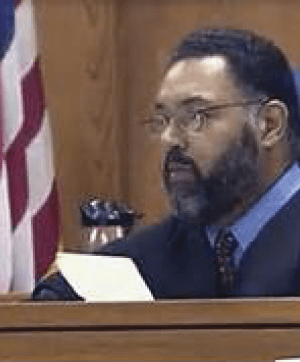 Cumberland County’s Veterans Treatment Court is one of 463 courts nationwide that offer mandatory rehabilitation and medical treatment for veterans arrested for certain misdemeanors and non-violent felonies. Last week, the U.S. Justice Department pledged to support more courts in this growing system, awarding more than $4 million to 13 state and local jurisdictions to develop their own programs. North Carolina is not among them this year. Some of the programs will likely be patterned after the one started nearly two years ago by District Court Judge Lou Olivera. It was launched with a grant from the Governor’s Crime Commission.
Cumberland County’s Veterans Treatment Court is one of 463 courts nationwide that offer mandatory rehabilitation and medical treatment for veterans arrested for certain misdemeanors and non-violent felonies. Last week, the U.S. Justice Department pledged to support more courts in this growing system, awarding more than $4 million to 13 state and local jurisdictions to develop their own programs. North Carolina is not among them this year. Some of the programs will likely be patterned after the one started nearly two years ago by District Court Judge Lou Olivera. It was launched with a grant from the Governor’s Crime Commission.
The Veterans Treatment Court is an alternative sentencing program designed to address the specific needs of veterans “who have returned from combat with injuries that are not visible,” said Olivera. Veterans are able to take part in a holistic program that addresses mental health and substance abuse issues, housing, employment, education and healthcare. The veteran must attend counseling, community support meetings, participate in a stringent drug testing program and perform community service. At the end of the year-long program, successful graduates may be eligible to have his or her original charges dropped or expunged.
Principal Deputy Associate Attorney General Bill Baer said that with one in six Iraq or Afghanistan veterans abusing alcohol or drugs — a situation that can contribute to arrest — the nation is obligated to help them productively reintegrate into society.
“Our military veterans risk life and limb for their country,” Baer said. “We owe our very best to help those who struggle with substance abuse,” he added. Baer spoke during a forum hosted by the justice department to mark Prescription Opioid and Heroin Epidemic Awareness Week. The abuse of opiates, especially heroin, is a national epidemic especially prevalent in Greater Fayetteville. Five years ago, Cape Fear Valley Medical Center recorded just one heroin overdose. Through Oct. 7 of this year, the number of overdose reports had grown to 96.
Fred Wells Brason II, director of North Carolina’s Project Lazarus, says the heroin problem in Fayetteville is worse than other areas of the state because of the presence of generally young, transient, lower income military men and women. They are more susceptible to depression, post-traumatic stress disorder and other mental health problems that can lead to drug and alcohol abuse. The good news is that according to data provided by Justice for Vets — an advocacy group that provides training for court staff — two-thirds of veterans who go through the Veterans Treatment Court system successfully complete the program. The system has proven so successful that the VA has mandated that every VA medical center have a veterans’ justice outreach specialist to provide legal assistance to veterans in their region. While veterans court advocates had sought $15 million for programs nationwide in 2016, they said any amount helps safeguard against veterans winding up in the prison system.
“I won’t let them fail,” said Judge Olivera who is himself a veteran. “I’ll help them find their way again,” he promised.

 How to resolve AdBlock issue?
How to resolve AdBlock issue? 








